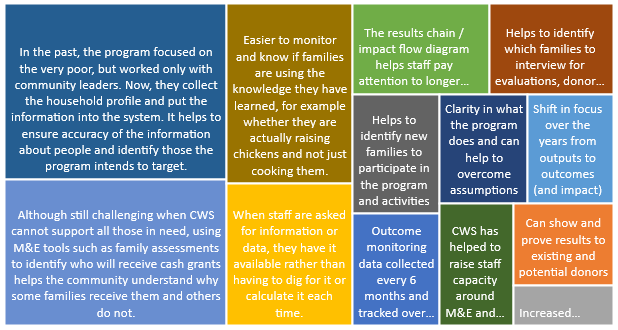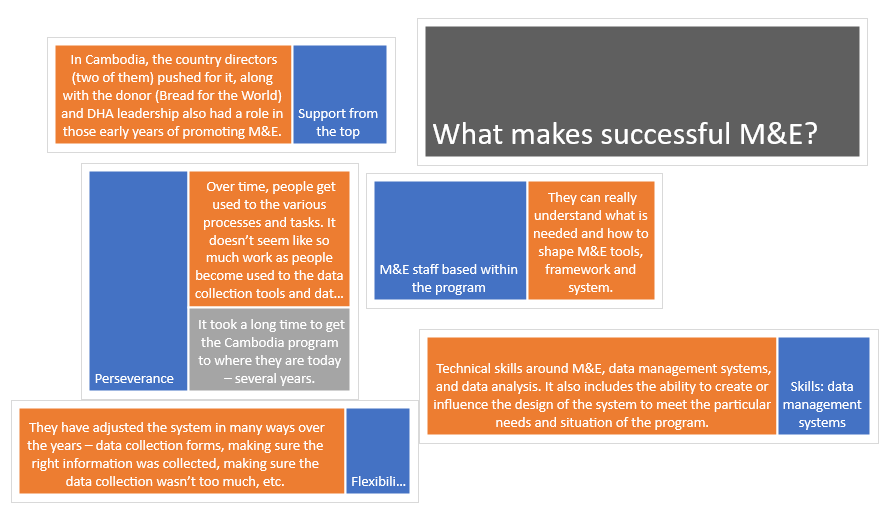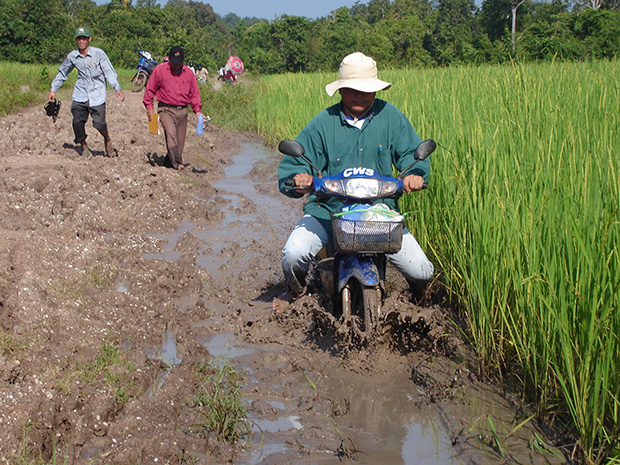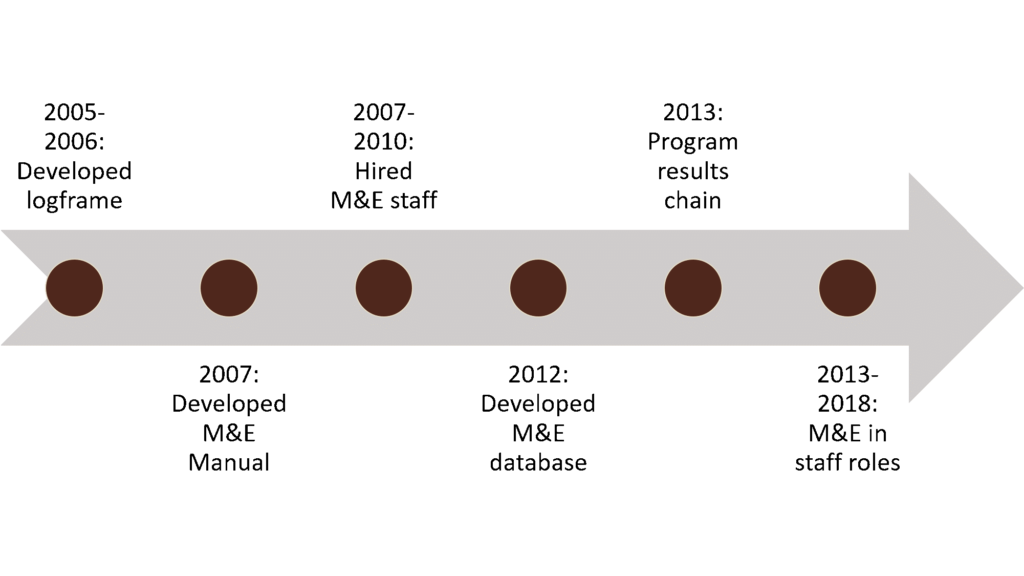
 In May 2018, I visited the CWS Cambodia program in the northern part of the country. CWS programs partner with rural communities and families that face numerous vulnerabilities and very difficult situations. The multifaceted programs address WASH, food security and livelihoods, help families move out of critical situations of food insecurity, and find ways to meet their basic needs with dignity. As part of that trip, I was able to speak in depth with two staff about the program’s M&E system that has developed over the years into a comprehensive system that contributes to accountability, internal learning and decision making.
In May 2018, I visited the CWS Cambodia program in the northern part of the country. CWS programs partner with rural communities and families that face numerous vulnerabilities and very difficult situations. The multifaceted programs address WASH, food security and livelihoods, help families move out of critical situations of food insecurity, and find ways to meet their basic needs with dignity. As part of that trip, I was able to speak in depth with two staff about the program’s M&E system that has developed over the years into a comprehensive system that contributes to accountability, internal learning and decision making.
This story starts over a decade ago. CWS country director, DHA leadership, and a funding partner, Bread for the World, started pushing for stronger M&E. As part of that movement, Bread for the World hired a consultant based regionally to support partner organizations as they started this effort. One of the first steps CWS Cambodia took was to develop a logframe in 2005-2006 that laid the foundation for what the program would measure. In 2007, the program developed an M&E manual and started implementing key M&E activities and processes. From 2005-2017, the program took a key step in hiring M&E dedicated staff. The staff member gave feedback to others about data collection, activities and implementation, other aspects of M&E, analyzed data, and provided M&E related support to partners. Being a part of program team was helpful to the person becoming an integrated part of program planning, implementation, monitoring and evaluation with an insider’s perspective of what was needed and how to appropriately shape M&E tools, framework and system. However, a lesson learned was the importance of finding the right person for the role – in this case, someone that was able to work well with the team, but also had technical skills to use data management software. This was a process, though, and the person that was the best fit, still connected with the program today, was more costly than originally planned. However, this was critical to bringing the program M&E up to the next level.
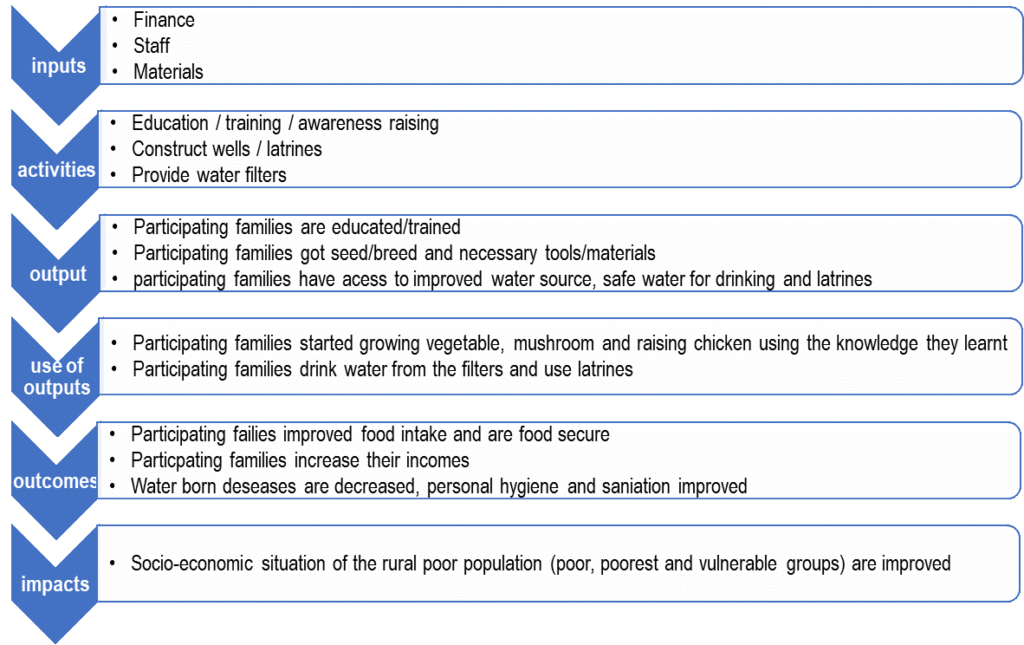 In 2012, the next step was to consider a more sophisticated M&E data management system. CWS Cambodia developed a database system using the SQL programming language. The system is still used today, adjusted over time as has been needed. In 2013, the program developed a results chain or impact flow diagram of the program, trained staff on it, and incorporated it into the program’s M&E processes since then. Since 2013, the staff size of the Cambodia program has diminished significantly, there are currently 9 total staff including 3 based in the field. Despite the shift, M&E continues to be a priority.
In 2012, the next step was to consider a more sophisticated M&E data management system. CWS Cambodia developed a database system using the SQL programming language. The system is still used today, adjusted over time as has been needed. In 2013, the program developed a results chain or impact flow diagram of the program, trained staff on it, and incorporated it into the program’s M&E processes since then. Since 2013, the staff size of the Cambodia program has diminished significantly, there are currently 9 total staff including 3 based in the field. Despite the shift, M&E continues to be a priority.
Both staff I talked with noted that M&E takes a lot of time and effort, but that it is well worth it. Although complicated at first and at times felt to be a burden, over time staff got used to it and are now proud of the system. Successes and benefits include:
In talking with staff members, one of my key takeaways was their enthusiasm around the M&E system. It was also exciting to see how their increased involvement with M&E over time has contributed to their appreciation and pride for what they and the team has accomplished. It took the team a long time to get where they are – several years. It also took consistent support from the top – two country directors and DHA leadership pushed for it all along the way, and continue to support strong M&E. Finally, it took flexibility to adjust the system as needed, such as revising data collection forms, making sure the right information was collected, being attentive that data collection wasn’t too onerous. They are now able to easily access program data and key program statistics, such as total reach, without double counting program participants across overlapping activities. They use the data for reporting and communications purposes, but also for internal reflection and planning. This year, they determined that the market share aspects of food security would be best to focus on, taking the work a step beyond where they are, given good results around families’ access to basic food through previous phases of the program activities. Right now, reports are shared with staff, but moving forward they intend to share the reports with local implementing partners, councils, etc., to further strengthen accountability in that direction and include those key actors in more aspects of programs.
All Hands On Deck Baseline Survey
One staff talked about a needs assessment the team did several years ago when they first began to work in a particular area. The area was particularly isolated and difficult to get to, even more so after rains when staff went in to do the needs assessment. The area was very impoverished, had been affected by the conflict and the difficult history within Cambodia, and people had little knowledge about certain practices, such as how to care for animals while maintaining a sanitary and hygienic home.
It was an all hands on deck effort to complete the needs assessment: many of the staff went out to do the survey, including a driver and other staff that would not typically be involved with such data collection (M&E is rarely perfect, so just doing it is often the first step…). They went by motorbikes for part of the trip, got stuck in the mud throughout, and there was certainly no guesthouse for staff to stay in. But staff completed the task, and were able to start working with the community to address the most pressing needs before other organizations ventured out to that part of the country. Over the years, CWS has seen incredible changes within that village – there are still a lot of struggles, but sanitation and hygiene practices have vastly improved, and families have been able to better meet their basic needs. From that first needs assessment, the program has been able to capture robust data and information about the situation. Furthermore, over the years, they have been able to demonstrate the improvements to people’s lives and the community as a whole. It is gratifying to the staff to see the changes over the years, but to also see the results in the data from monitoring and evaluation over the years.
Thank you to Ek Sothea, Project Manager, and Pich Phourith, Project Manager, Ven Vannavuth and Seng Layseang, Community Development Facilitator- for the discussions with them and their work with the CWS Cambodia M&E activities more generally.

